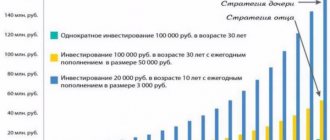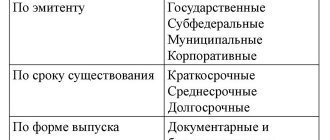olegas 2 years ago / 31 Views
OFBUs are inherently very close to mutual investment funds (MUIFs), with the difference that their operations are not subject to the same strict control by regulatory authorities. In fact, OFBU can invest funds in all legal financial instruments and structures (acting as investment objects). By the way, the same mutual fund can invest funds of shareholders only in a limited number of financial instruments permitted for it.
With much greater freedom of choice comes much greater potential for profit. That is, the profitability of OFBUs, a priori, can be much higher than that of mutual funds.
OFBU - in simple words
The general bank management fund is property consisting of investors' shares and managed by a commercial bank. To carry out this type of management and in general to organize a public financial institution, a license from the Central Bank of the Russian Federation is required.
In general, the creation of such a fund requires compliance with a number of conditions:
- A bank that decides to create an OFBU must have been registered more than one year ago;
- The bank's capital must be at least one hundred million rubles (and we are talking here specifically about the bank's own capital);
- During the last six reporting dates, the bank must be assigned a category of at least “financially stable”.
Investors who have invested their money in the general bank management fund receive a document in their hands in the form of a certificate of equity participation. Such a certificate cannot be sold on the market (it is not a security), but can be bequeathed by inheritance or re-issued to another person (based on an application to the bank that issued the certificate).
OFBUs are required to keep all their assets (funds of shareholders) in separate accounts, independent from the managing bank. For these purposes, a correspondent account is created with the Bank of Russia (for ruble assets) and an account with a credit organization authorized by the Central Bank of the Russian Federation (for assets in foreign currency). Thus, the property of the shareholders is isolated from the property of the bank manager, and in the event of the bankruptcy of the latter (or the revocation of his license), the investments of the shareholders will not suffer in any way.
Both residents and non-residents of the Russian Federation can act as shareholders of OFBU. All control over the activities of the fund is exercised by the Central Bank of the Russian Federation. Investment objects can be:
- FOREX currency market instruments;
- Exchange market instruments (securities, including derivative financial instruments);
- OTC market instruments;
- Instruments of the precious metals market;
- Commercial and residential real estate;
- Etc. and so on.
At the same time, funds of shareholders may be managed in the form of:
- National currency;
- Foreign currency;
- Precious stones and metals;
- Liquid securities;
- Derivative financial instruments.
All this opens up wide opportunities for investment, which these funds actively take advantage of. Aggressive investment strategies can bring shareholders an income of 30-40% per annum. But there is one important limitation for OFBU: you cannot invest more than 15% of funds in the same investment object. For example, when purchasing shares, you cannot invest in the securities of one issuer with a share exceeding the specified limit of 15%. However, this prohibition loses force when it comes to investing in government securities (here the interests of the state come first, and the interests of the fund’s shareholders, accordingly, are relegated to the background).
Currently, 274 general banking management funds are registered on the territory of the Russian Federation. The most famous of them include OFBU banks Absolut, Zenit, VTB, Gazprombank.
Becoming a shareholder of such a fund is quite simple; to do this, you need to select a fund and contact the bank that manages it. A trust management agreement for the depositor's property is concluded with the bank, and the depositor himself (that is, you) is issued a certificate of equity participation. The minimum deposit amount may vary from fund to fund and range from several thousand to several hundred thousand rubles.
Do you know what OFBU is?
Two words – investment fund – have been on everyone’s lips lately. What is an investment fund
? This is the pooling of funds from many investors for their subsequent management by professionals. Moreover, a money management strategy is initially specified.
Many people understand funds as investing money in the Russian economy. But it is not so! Not everyone knows that funds allow you to invest money in the development of the economy of any country in the world.
Over the past three years, Russia has brought super-profits to its investors, and this was justified by well-known factors: the undervaluation of shares of Russian companies, the Yukos affair and high oil prices. Let me note that every state goes through this stage of development. Experts agree that Russian companies will most likely no longer bring in super-profits. But there are still many countries in the world that are on the verge of such a “banquet for investors.”
Today, only the General Funds of Banking Management (GFBU) provide the opportunity to participate in the rapid development of the world economy. How? Judge for yourself. The fund includes dozens and even hundreds of companies around the world. Companies undergo a careful selection of professional managers. For example, the Chinese Equity Fund managed by Uniastrum Bank includes 50 of the largest corporations in China. Their development in 2006 brought investors a return of 82.61%, and the fund was recognized as the most profitable based on the results of the year. And this is far from the limit!
Considering the above, it would be logical to talk about OFBU in more detail.
General Funds of Banking Management is the result. The result of centuries of evolution of trusting relationships.
Trust management relationships arose in the ancient world. In particular, in Ancient Egypt, governance was carried out by priests of temples or close associates of the pharaohs in the form of guardianship. Their activity was related to the execution of wills until the children of the pharaohs reached a certain age.
England in the 12th century introduced the concept of “trustee” to the world. This happened thanks to the Crusades, when knights, leaving home for a long time, entrusted the management of their property to outsiders on the basis of an agreement.
The growth in the welfare of the population and the development of the financial market have led to the emergence of a need for trust management services.
Initially, individual trust management was offered for wealthy clients. This service was provided by the largest investment companies. With the increase in the number of clients and the impossibility of high-quality management of multiple investment portfolios, the need arose to unite clients with the same strategies
. After the Second World War, the concept of “collective investment” arose.
Today, collective investment in Russia is represented by Common Funds of Banking Management (FBU) and Mutual Investment Funds (UIF).
But let's return to OFBU. The most important point for any investor is reliability
investments. Reliability depends on:
ü the organization that manages our money - the trustee; ü structure that controls the activities of the trustee; ü other factors.
Firstly, Instruction No. 63 dated July 2, 1997 stipulates that a credit institution providing trust management services must meet the following requirements:
1. at least one year has passed since the state registration of the credit organization; 2. the amount of the credit institution’s own funds must be at least 100 million rubles; 3. the credit institution, as of the last six reporting dates before the date of the decision to create the FBU, must be classified in category 1 in terms of financial condition - “Financially stable banks”.
Secondly, the Bank of Russia exercises a control function in relation to OFBU. Clients' money is stored in a special account with the Central Bank of the Russian Federation or in a Bank authorized by the Central Bank of the Russian Federation. This fact allows us to say with confidence that in the event of a financial crisis or bankruptcy of the Trustee Bank, the money will be returned to depositors.
It is equally important to consider reliability from a slightly different angle.
Many people compare OFBU to a deposit, and this makes sense. Funds can be an alternative to a deposit for a period of 1 year or more. Here it is necessary to make a reservation: the deposit has a fixed percentage of return and an initially agreed upon investment period. The return on funds can only be assumed, and the investment period is not specified in the contract. This means that you can withdraw money from the fund at any convenient time, and the income is potentially unlimited. Why is income not limited? Because money is invested in securities of the most promising companies, according to analysts. Because all stock markets rise over time - that is their philosophy.
It is important to choose a management strategy that is suitable for you before investing in funds. This can be an aggressive strategy aimed at obtaining the highest possible income, or a conservative one - a uniform increase in capital.
Aggressive strategies are based primarily on stocks. Fluctuations (corrections) in the markets are inevitable. What matters is how long it takes for them to recover the value of the previous high. This kind of strategy is characterized by deep drops in value and sharp jumps up. It is necessary to invest in aggressive funds if you are almost sure that you will not need the money for at least two years. If you are calm about fluctuations in the market. If you can wait out the period of decline and withdraw money during active market growth. Conclusion: the concept of risk in aggressive funds is relative. The time factor is important here.
OFBUs have the opportunity to provide cautious investors with “their own” strategy, which is characterized by a relatively small constant income and the absence of sharp fluctuations. This is possible thanks to bond funds. They are called conservative. In any case, the yield of conservative funds exceeds
rates on bank deposits
doubled
. The best bond fund in 2006, according to the Analytical Service, was the Kutuzov Fund managed by Uniastrum Bank. Its yield was 24%.
The number of funds managed by one trustee is not regulated, and some banks are taking the path of creating entire families of investment funds. For what? A large number of funds allows you to create an effective investment portfolio. Allows you to distribute money to the most promising, according to analysts, funds.
Banks provide the service of transferring funds from fund to fund
. This makes it possible to wait out a period of falling stock markets in more conservative funds and make money on growing markets.
We have gradually come to the most important advantage of OFBU over other investment methods. These are almost limitless investment opportunities. Do you believe in a developing country, Mexico, for example? Do you have information that the price of gold will increase in the future? Bet on high returns in the global financial sector? Why not buy securities of these companies? Yes, not just one, but dozens of companies from the country or economic sector you are interested in?
Foundations provide this opportunity. All you have to do is choose, listening to your intuition or the arguments of professionals.
An important point is the minimum threshold for investing in funds. It varies depending on the Bank.
The minimum amount that is presented on the OFBU market is 1000 rubles. for funds in rubles and $100 for funds in foreign currency. Considering the population’s wariness towards everything unknown and new, the minimum threshold allows you to “try” investing in funds, learn in practice how the OFBU works, how profitability is calculated, and grasp the subtleties when creating an investment portfolio. Thanks to the help of professional consultants and a small threshold for entry into Ford, the creation of an effective individual investment portfolio is available to everyone.
The procedure for purchasing OFBU shares is simple. To register the purchase of fund shares, the client needs a passport, in some cases it is necessary to provide a TIN. Registration takes no more than 40 minutes.
I would like to add that today, 28 credit institutions are most active in the Russian OFBU market. They are the “pioneers” for other companies, because experts predict a great future for this service.
All we have to do is choose!
Scheme of operation of general funds of banking management
In order to become a shareholder of the OFBU, it is enough to contact the bank on the basis of which the selected fund was created. Currently, there is a large selection of funds of this kind with a wide variety of areas and investment strategies. The investor can choose from them the one that fully satisfies his expectations in terms of potential profitability and risk appetite.
Having signed the agreement and deposited funds in the form of money or other material assets (as we have already said, precious metals, securities, and derivative financial instruments can be accepted as the investor’s share here), the investor receives a certificate of equity participation.
Scheme of operation of the OFBU
In the event that the funds contributed by the investor are presented not in the form of money, but in the form of other assets, they are assessed (translated into monetary form). The valuation amount is included in the share participation certificate, which, together with the property acceptance certificate, is transferred to the investor.
The investor can request a report on the fund’s work at any time, thus always remaining aware of all its affairs.
In the event that it is necessary to withdraw his investments from the fund, the investor writes a corresponding statement and exchanges his certificate for an amount of money equal to the amount originally deposited by him, plus the interest earned as a result of the fund’s activities.
In general, payment of income to investors can be carried out in several ways:
- Periodic payment of interest based on the results of the fund’s activities (if, of course, the fund showed a profit for the past reporting period). A schedule may be drawn up to pay interest at specified intervals, such as once a month or once a year. Let’s say if, with a deposit amount of 50,000 rubles and an agreed monthly interest payment, the fund showed a profit for the past month of 10%, and the amount of costs associated with managing the fund amounted to 0.5%, then the investor will receive a profit of 9.5% or 4750 rubles;
- Interest may not be paid, but gradually added to the amount of the principal deposit. In this case, the so-called effect of compound interest begins to work. In this case, the investor receives the entire amount with accumulated interest only upon expiration (or termination) of the contract.
Advantages of investing in OFBU
Let's start, as usual, by listing the main advantages of investing in this type of fund:
- Essentially, funds are invested in a widely diversified and professionally managed fund, which actually turns them into a source of passive income without bothering the investor with the intricacies of management and diversification;
- The opportunity to receive a higher income in comparison not only with such conservative instruments as bank deposits or government bonds, but also in comparison with mutual funds;
- All expenses associated with the activities of OFBU (management fees, etc.) are determined upon signing the contract and remain unchanged throughout the entire investment period;
- Due to the fact that OFBUs are created on the basis of banks, they can fully use their entire infrastructure, which includes their own depositories, internal control and general banking audit. This, in turn, reduces overhead costs and, accordingly, has a positive effect on the profits of fund shareholders.
Of course, investing in such funds is associated with a certain amount of risk. After all, a more aggressive investment strategy, which is available to the managers of such funds, in addition to potentially greater profits, also carries potentially greater risks. However, it is not at all necessary that every bank managing such a fund will pursue an aggressive investment policy.
Well, you should keep in mind the fact that no one guarantees you that investments in OFBU will bring profit and not turn into losses (for example, as happened with the vast majority of funds during the 2008 crisis). No one is immune from the mistakes of fund managers and from global financial crises.
Housing stock
The fund has a slightly different format than the organizations presented above. It does not accumulate material resources, but combines all residential buildings and residential premises of the state. This concept is considered basic in all housing legislation. The housing stock is considered the dominant state asset, in the preservation and preservation of which the entire society is interested. The generalized concept includes substructures differentiated according to the following criteria:
- belonging to a certain form of ownership (private, municipal and state);
- specific use of residential premises (social use fund, commercial and individual).
Like the Pension Fund, its housing analogue is controlled by the state, which keeps its records in accordance with the procedure determined by the Government of the Russian Federation. The system does not include buildings and premises that are intended for seasonal or temporary residence, regardless of its duration. Unauthorized structures are not included in the fund. Those objects that are not part of the structure cannot fall under the norms of housing legislation, and it is very difficult to carry out any manipulations with them, including re-registration.
The main differences between OFBU and mutual funds
Although these two organizations are very similar to each other, there are nevertheless a number of significant differences between them:
- When investing in a mutual fund, the investor receives a security - an investment share, which is traded on the stock exchange and can be accepted by the bank as collateral when issuing a loan. When investing in OFBU, the investor receives a certificate of equity participation that is not a security, with all the ensuing consequences (it cannot be bought/sold on the stock exchange, used as collateral, etc.);
- General bank management funds undoubtedly have greater investment opportunities. OFBU can invest funds of shareholders in everything that is not prohibited in principle, and a mutual fund can invest only in what is allowed to it;
- Contributions to mutual funds are made in the form of cash, usually in national currency. And in OFBU you can invest not only money in any liquid currency, but also securities, precious metals and stones, etc.
- During times of stock market downturns (during periods of financial crises, for example), the most optimal strategy may be to convert the majority of the fund's assets into cash. OFBU can afford this, and the mutual fund is obliged to maintain the composition of its portfolio in the proportions specified for it. Naturally, this can be fraught with relatively large losses;
- OFBU is controlled only by the Central Bank of the Russian Federation, and mutual funds are under the supervision of several regulatory organizations. In addition to the same Bank of Russia, it is controlled by a registrar, an independent appraiser and an auditor. This, in turn, leads to the fact that the share of overhead costs associated with this control and falling on the shoulders of investors is slightly lower for OFBU than for mutual funds.
- Categories
- Tags
Investments, Trader's Dictionary
- Related Articles
- Author
Meaning of the word fund
When characterizing the finances of legal entities, it should be noted that they include such state extra-budgetary funds that play an exceptional role in ensuring the social security of citizens, such as the Pension Fund of the Russian Federation, the Social Insurance Fund of the Russian Federation, the State Employment Fund, the Federal and territorial compulsory health insurance funds. The financial system also includes non-state funds (federal and regional, for example, non-state pension funds); banking system funds; funds of insurance organizations; funds of public and regional organizations; funds of other legal entities. By Decree of the President of the Russian Federation of December 22, 1993.
Centralized financial resources are formed and used primarily in the form of cash funds, which include, for example, the budget, social insurance fund, road fund, fund for the reproduction of the mineral resource base and other extra-budgetary and special funds consolidated in the budget.
General financial and legal characteristics of state extra-budgetary funds: Pension Fund of the Russian Federation, Social Insurance Fund of the Russian Federation, Federal Compulsory Medical Insurance Fund and territorial extra-budgetary funds of compulsory medical insurance
In the Russian State Archive of Socio-Political History (RGASPI) (formerly the Central Party Archive of the Institute of Marxism-Leninism under the CPSU Central Committee), Trotsky’s materials are concentrated in his personal fund, but are found in many other funds (fund of the CPSU Central Committee, personal funds of other party leaders, etc.) ...), ending mainly in November 1927, when Trotsky was expelled from the party.
“In fact, we are talking about the fund working as a fund of funds and focusing primarily on infrastructure, on working with international infrastructure funds and supporting investment projects,” says Alexander Galushka.
A similar method of collecting funds is the method of mandatory payments (contributions) to state extra-budgetary funds (Pension Fund of the Russian Federation, State Employment Fund of the Russian Federation, Social Insurance Fund of the Russian Federation, Federal and territorial compulsory health insurance funds).
Extra-budgetary funds include the Pension Fund, the Social Insurance Fund and the Mandatory Medical Insurance Fund.
State extra-budgetary funds (environmental fund, road funds, customs development fund, etc.), consolidated with the federal budget and budgets of the constituent entities of the Russian Federation, retain their intended use (purpose). Describing the financial activities of the state, it is necessary to emphasize that this is a special type of state activity, since it is carried out by state bodies of all three branches of government: legislative, executive and judicial within their competence. Financial activity is carried out in accordance with the principles inherent in all activities of the Russian state and enshrined in the Constitution of the Russian Federation.
A study of trends in the formation of library collections under conditions of centralization showed that the total book collection of a centralized library system, both in composition and volume, is quite comparable to the collection of a large universal library.






